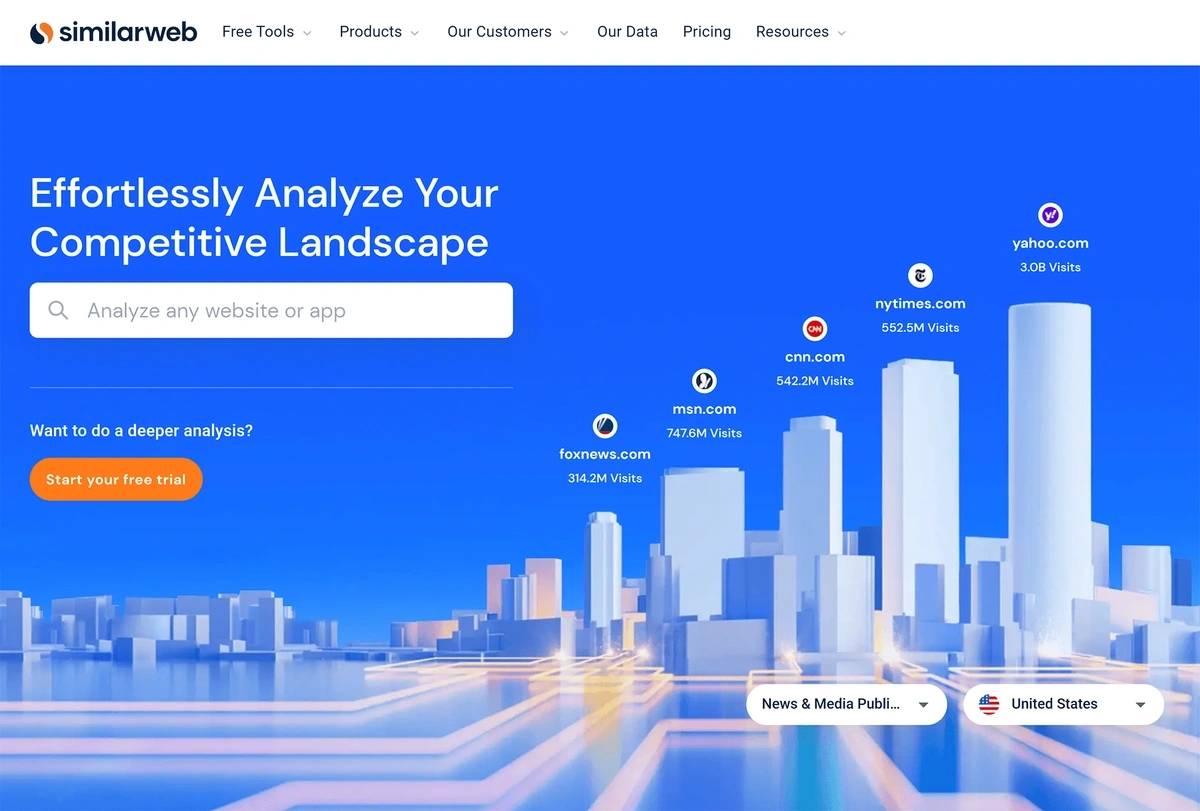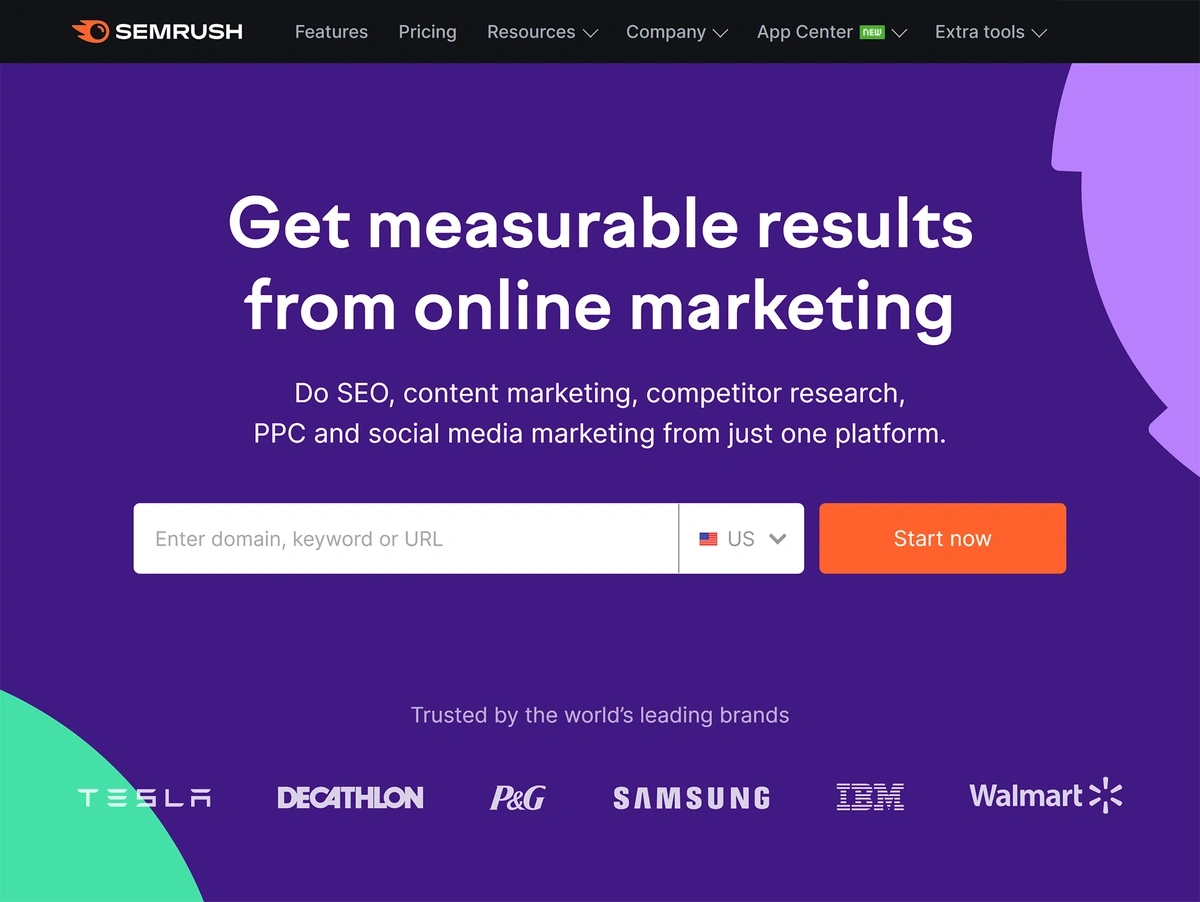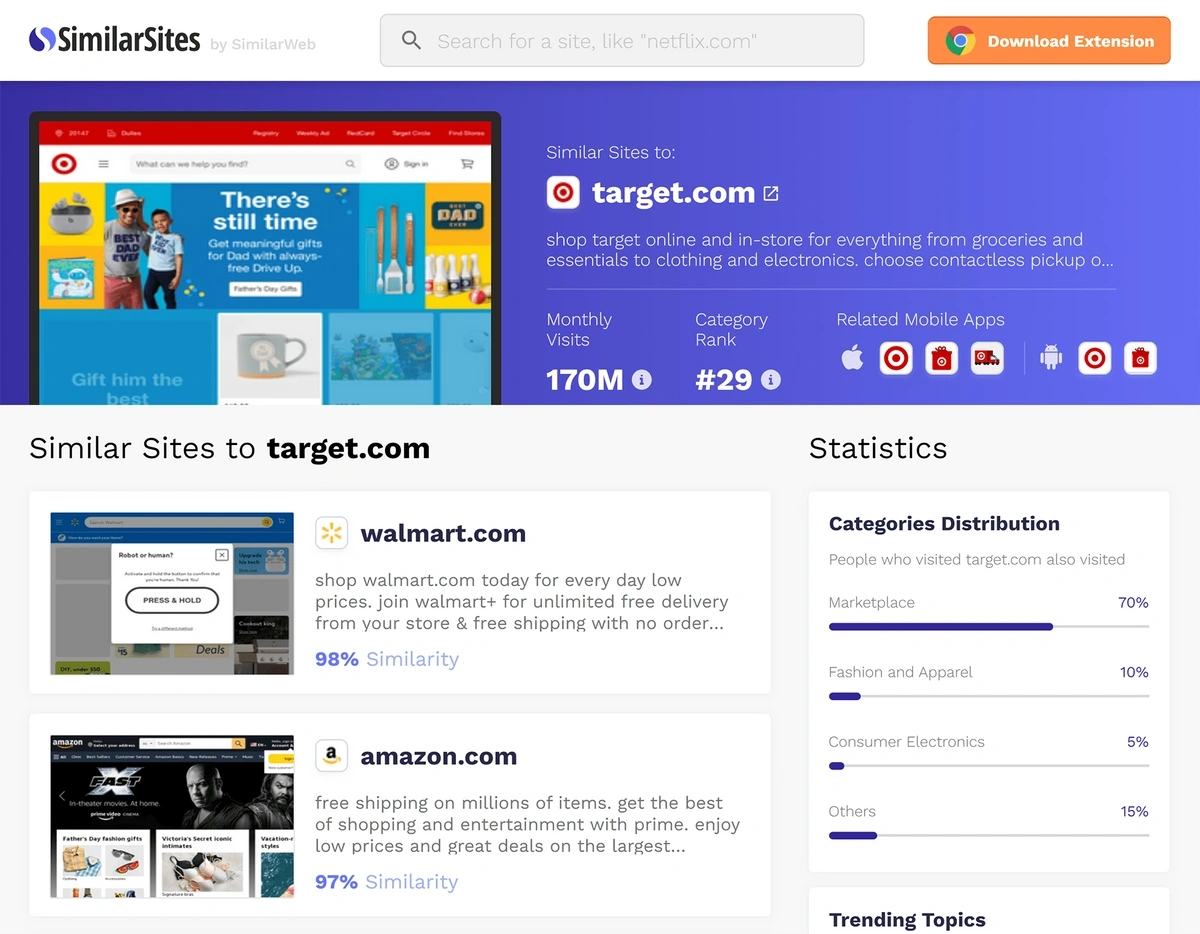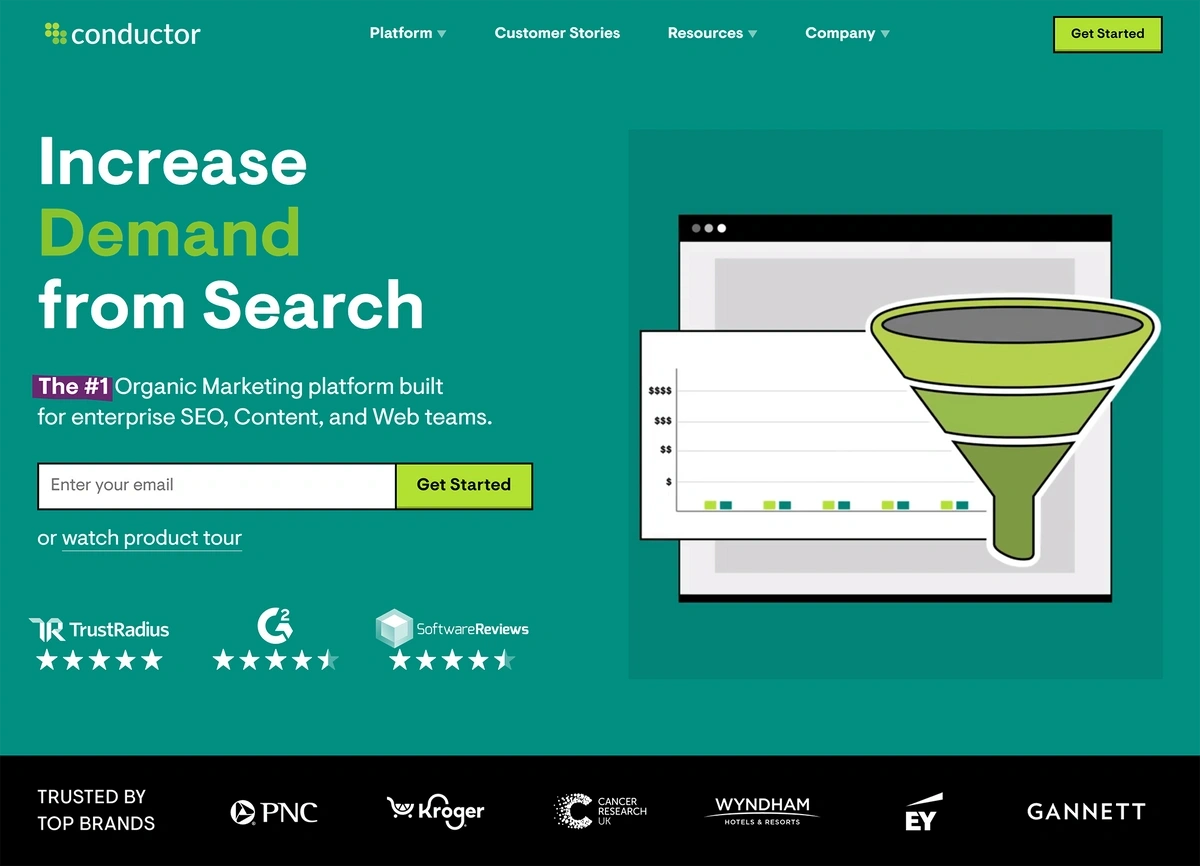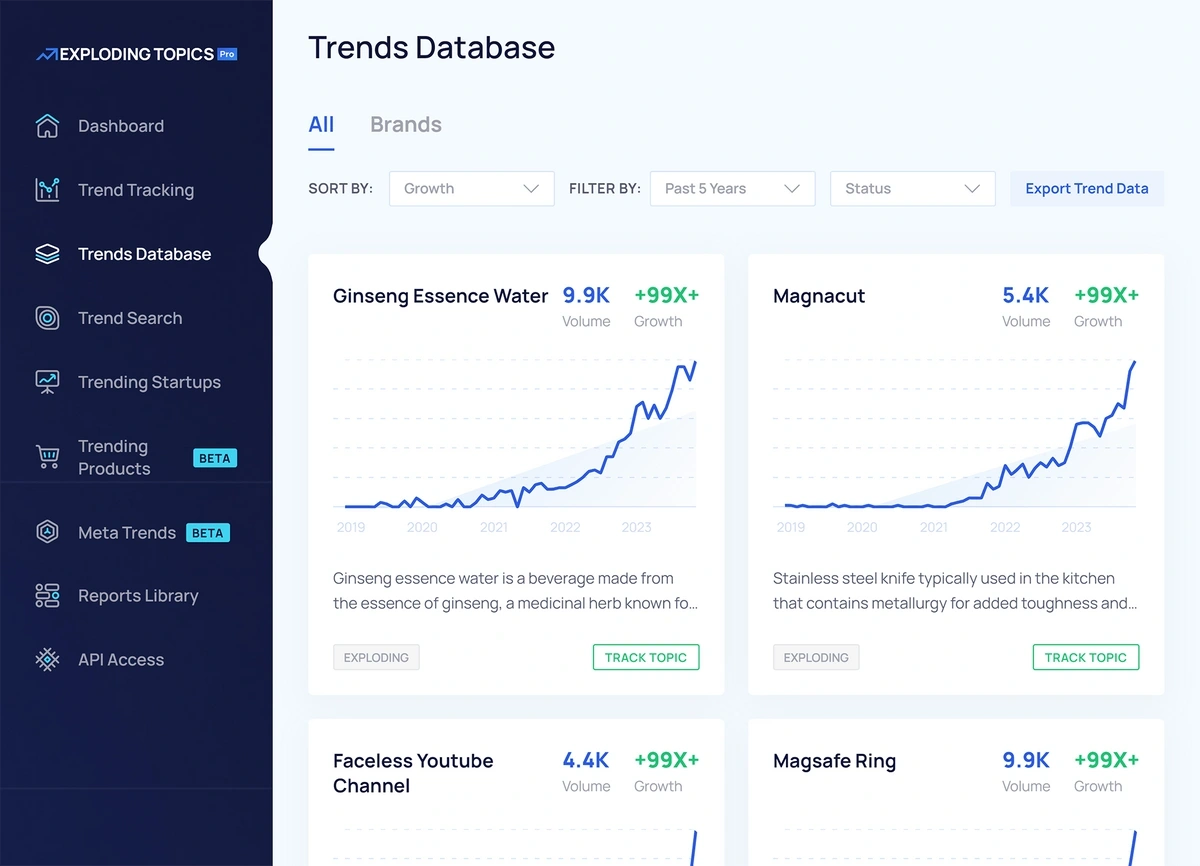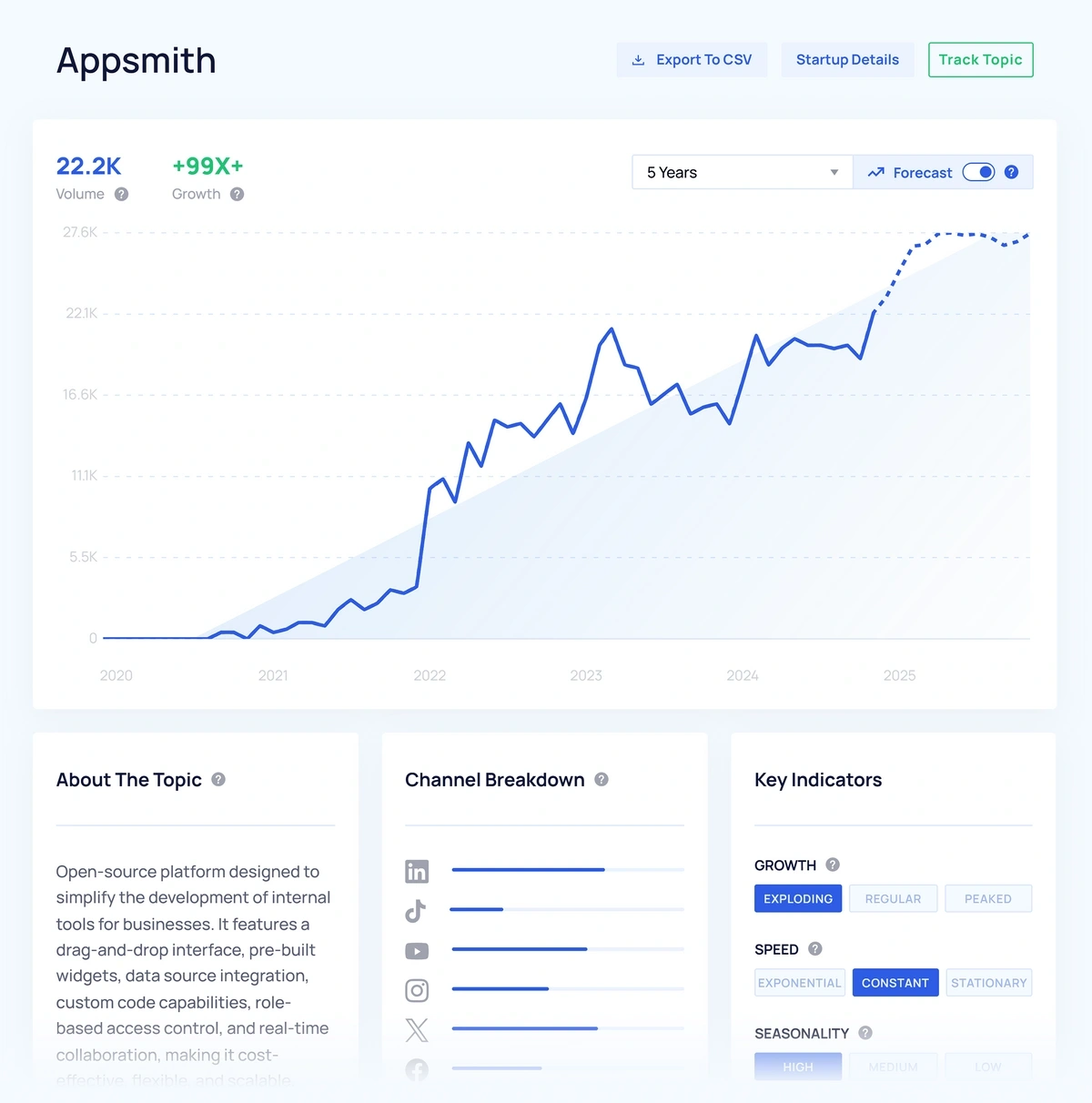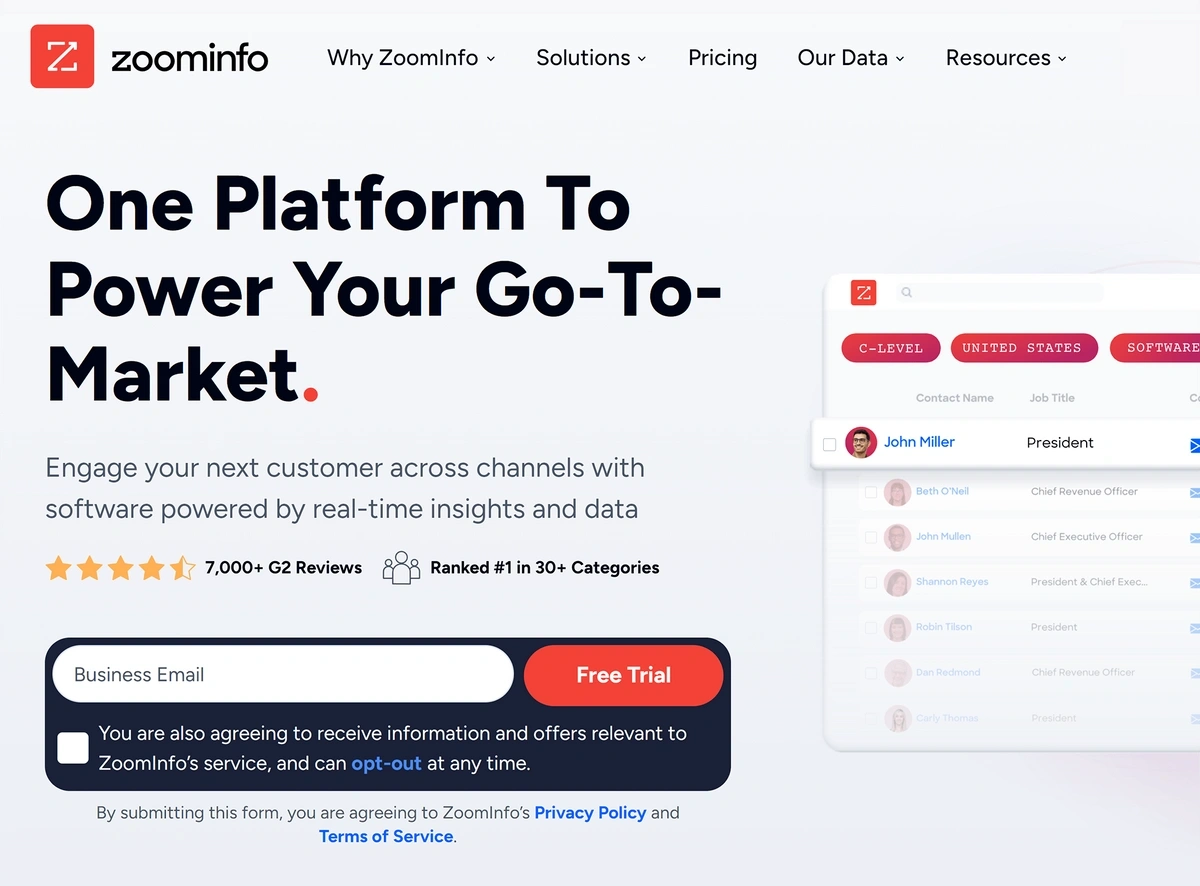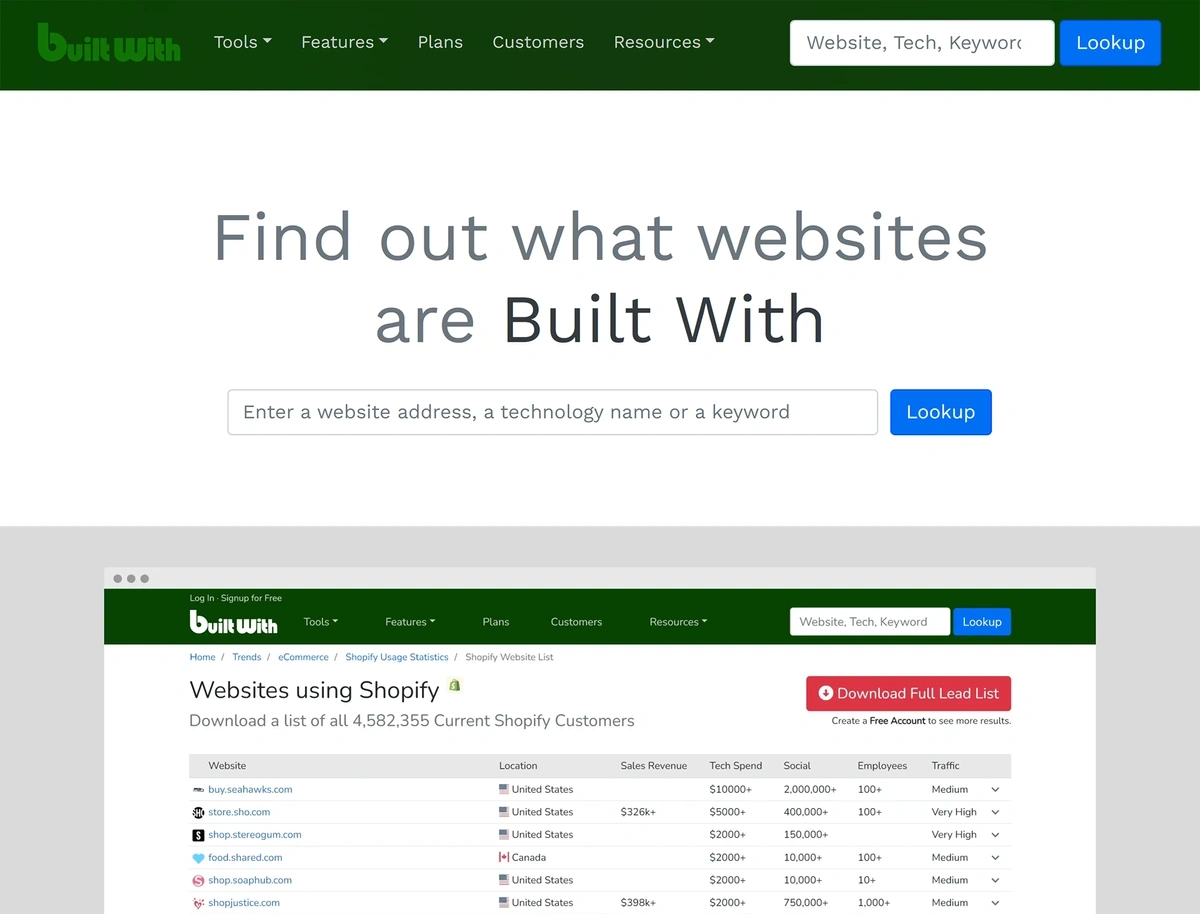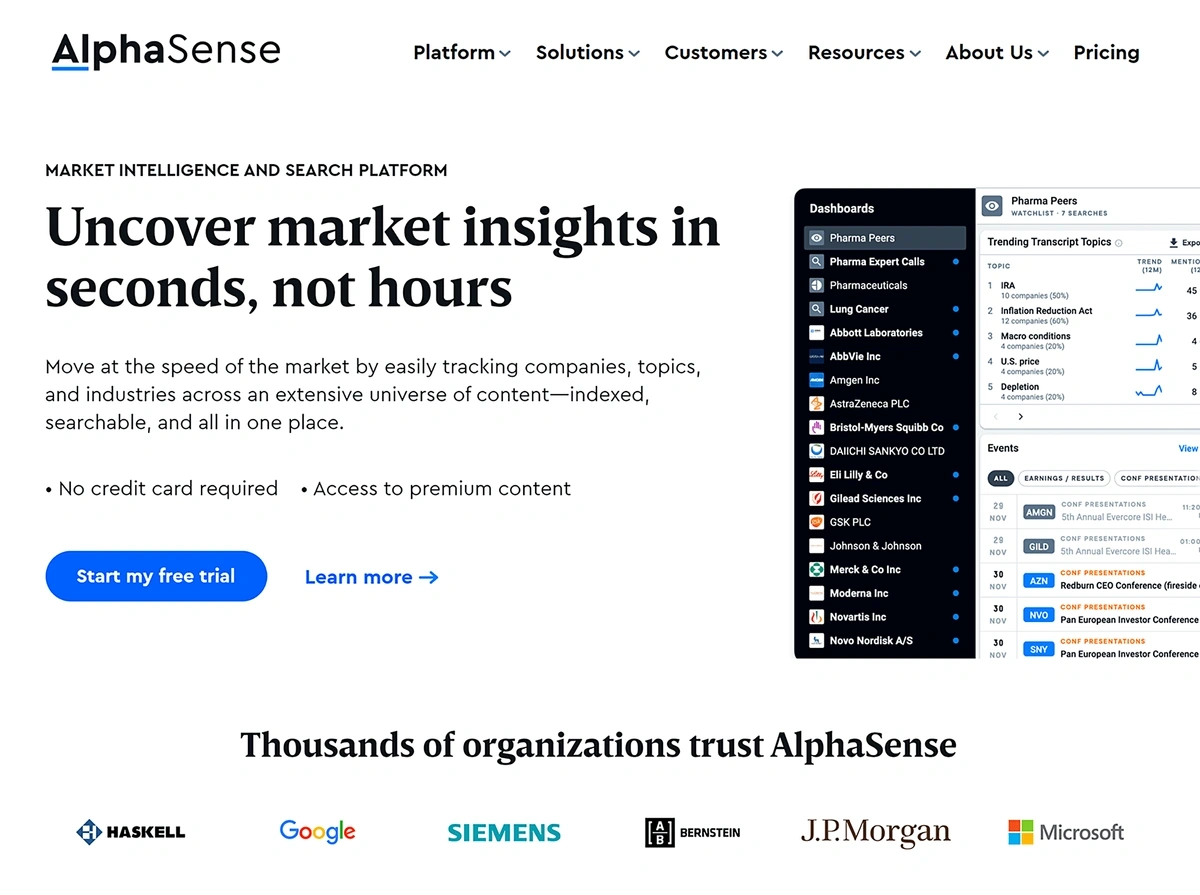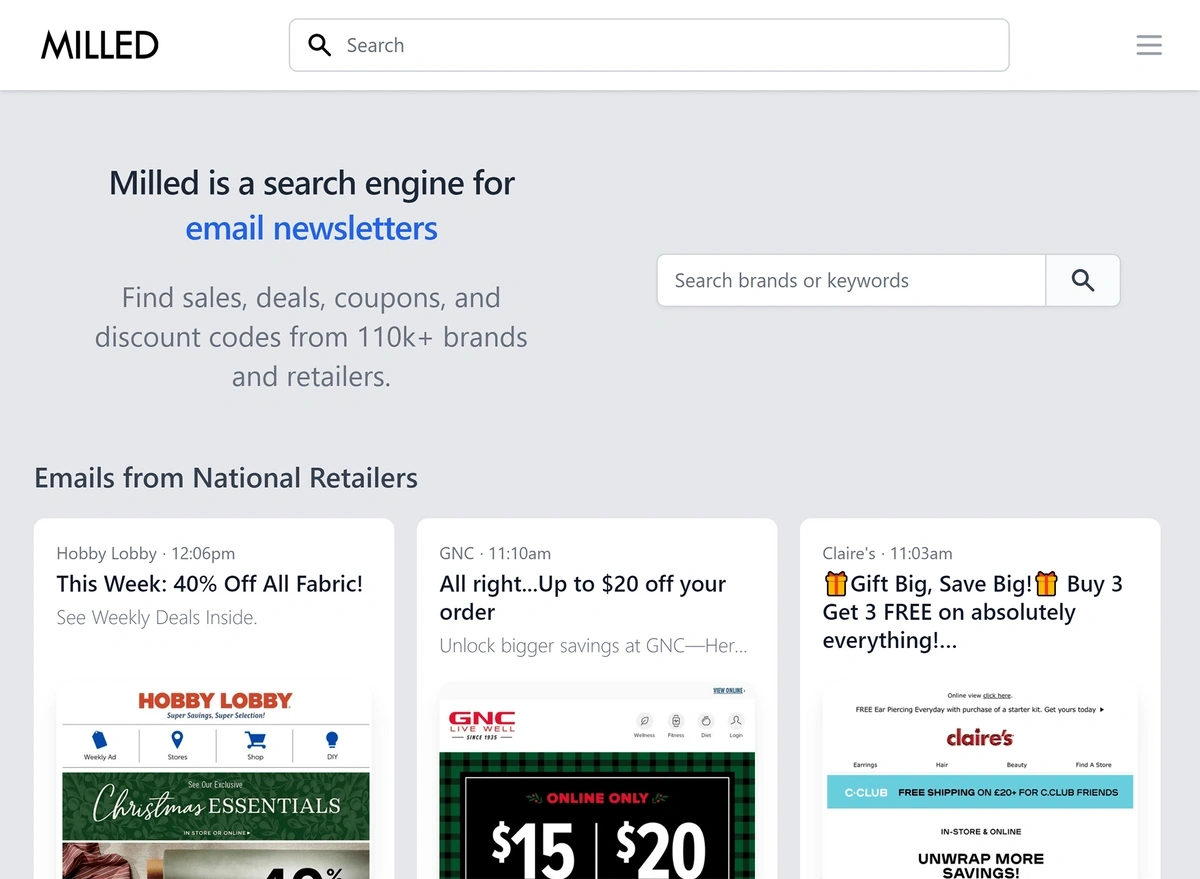Get Advanced Insights on Any Topic
Discover Trends 12+ Months Before Everyone Else
How We Find Trends Before They Take Off
Exploding Topics’ advanced algorithm monitors millions of unstructured data points to spot trends early on.

Features
Keyword Research
Performance Tracking
Competitor Intelligence
Fix Your Site’s SEO Issues in 30 Seconds
Find technical issues blocking search visibility. Get prioritized, actionable fixes in seconds.
Powered by data from
8 Top Similarweb Alternatives & Competitors (2024)
Similarweb is a competitive research platform that provides information about website traffic, audience demographics, consumer behavior, company finances and more.
It's a useful tool for many entrepreneurs and marketers, and it ranks among the top 5,000 sites in the US for traffic. But it's not the only place to find these kinds of insights. In this guide, we'll walk you through eight of the top Similarweb competitors available right now.
1. Semrush: Best For Complete SEO Research
Semrush is a search engine optimization (SEO) tool that provides a wide array of competitor insights.
If you like the website, keyword, and competitor insights available through Similarweb, but want to go even deeper into competitor keyword and PPC ad analysis, Semrush can help.
With a Semrush account, you can see all of the following—and more—about a competitor:
- Total website traffic
- Traffic from organic search vs. paid advertising
- Other competitors appearing high up on search engine results pages (SERPs)
- The number of websites with backlinks to your competitors
- Where most of your competitors' organic traffic is coming from
- The devices your competitor's audience tend to use
- Related keyword rankings and associated search volumes
- Competitor website bounce rates, domain authority, and other metrics
- Top trends related to your competitor's products or industry
You can also use the platform to see all of this information about your own website, too.
The array of SEO tools available in Semrush makes it a good choice for marketing teams that need to monitor competitors, track their own campaigns, plan content strategies, and more. You can read a more detailed Semrush vs Similarweb comparison here.
How Much Does Semrush Cost?
Semrush offers a free plan that gives you limited insights into competitor websites and traffic or keyword analysis.
To unlock more Semrush features, you'll need a paid plan. Options start at $139.95 per month, or $117.33 per month when billed annually.
Semrush vs. Similarweb: At a Glance
| Semrush | Similarweb | |
| Starting price | Free | $125 per month, billed annually |
| Unique features | Website audit, rank tracking, and keyword research tools; in-depth traffic analytics | Audience loyalty analysis, business contact database, consumer behavior analysis, average online order metrics by brand |
| Good for | Marketing teams with a variety of research, on-page, off-page, and technical SEO needs | Anyone conducting a high volume of competitor research for marketing or business purposes |
2. SimilarSites: Best For Quick Competitor Analysis
SimilarSites is a Google Chrome extension that lets you see top-level details about competitor websites.
The extension is actually a Similarweb product, but it's worth talking about on its own.
If you're primarily interested in using Similarweb to find out information about competing websites, then SimilarSites might actually be all you need.
You can use the SimilarSites extension or website to see information including:
- Total monthly visits to a competitor's site
- Mobile apps and other websites related to that competitor
- How the competitor stacks up against others in its industry
- Trending topics related to the site you're searching
If you were interested in some of Similarweb's other features, though—like doing a deeper analysis around competitors' ad campaigns or customer buying habits—then you'll want to stick with another alternative on this list.
How Much Does SimilarSites Cost?
SimilarSites is free to use.
SimilarSites vs. Similarweb: At a Glance
| SimilarSites | Similarweb | |
| Starting price | Free | $125 per month, billed annually |
| Unique features | Chrome extension for quick site analysis | Audience loyalty analysis, business contact database, consumer behavior analysis, average online order metrics by brand |
| Good for | Marketers or entrepreneurs in need of top-level competitor intelligence insights | Anyone conducting a high volume of competitor research for marketing or business purposes |
3. Conductor: Best For Competitor Content Analysis
Conductor is a digital marketing tool that evaluates website and content performance.
Like Similarweb, Conductor allows you to see details about your competitors' sites and audiences, including:
- Number of website visitors
- Top marketing channels
- Devices used by visitors
- Key demographic metrics
- Other possible competitors in the same market
Conductor goes beyond what Similarweb offers, though, and also includes a robust toolset to help you better optimize your site and content.
You can also use Conductor to do things like:
- See trending topics in Google search and on social media
- View the locations where a trend is most popular
- Assess the quality of content—either yours or a competitor's
- Create content briefs complete with target keywords and reference links
- Conduct research for pay per click (PPC) ad campaigns
If content creation is an important part of your marketing strategy, then Conductor may be able to replace Similarweb and other tools in your current tech stack.
How Much Does Conductor Cost?
Conductor doesn't publish its pricing publicly; interested users have to get in touch with the company for a customized demo and price quote.
Conductor vs. Similarweb: At a Glance
| Conductor | Similarweb | |
| Starting price | Custom quotes | $125 per month, billed annually |
| Unique features | Content brief creator, trending topic analysis, PPC research tools | Audience loyalty analysis, business contact database, consumer behavior analysis, average online order metrics by brand |
| Good for | Content marketing teams in need of competitive analysis tools | Anyone conducting a high volume of competitor research for marketing or business purposes |
4. Exploding Topics: Best For Industry Trend Analysis
Exploding Topics is a trend spotting platform that shows you what people are talking about online.
While Similarweb and a number of its competitors do show some trend data, Exploding Topics gives you an unparalleled level of insight into trending online conversations.
When using Exploding Topics, you can:
- See how interest in a topic has changed over the past 15 years
- Get an idea of how interest in a trend might change over the coming months
- Assess which topics are poised to blow up in popularity—and which ones are entering into a decline
- Find out where people are discussing a particular topic the most—be it on TikTok, LinkedIn, Reddit, or another platform
- Keep an eye on competitors' popularity
- Analyze how popular trending e-commerce products really are
- Be alerted to any new, popular startups entering your industry
- See how trends relate to and influence each other
We're constantly scanning for, evaluating, and publishing the top trends you need to know about—complete with regular reports that break down key details about popular topics.
How Much Does Exploding Topics Cost?
It's free to start using Exploding Topics right now—you can start a search on our homepage.
For access to all of our features, you'll need an Exploding Topics Pro account.
Options start at just $39 per month, billed annually. Plus, you can try out any plan for a week—it's just $1 to start.
Exploding Topics vs. Similarweb: At a Glance
| Exploding Topics | Similarweb | |
| Starting price | Free | $125 per month, billed annually |
| Unique features | Daily updates, trend graphs, expert trend analysis, startup and e-commerce product trend | Audience loyalty analysis, business contact database, consumer behavior analysis, average online order metrics by brand |
| Good for | Marketers and entrepreneurs interested in need of reliable trend data | Anyone conducting a high volume of competitor research for marketing or business purposes |
5. Zoominfo: Best For Sales Contact Research
Zoominfo is a sales and marketing platform that allows users to look up business contact information.
If you're drawn to Similarweb due to its database of B2B contacts, you may find you get more of the data you want when using Zoominfo. You can use the platform to:
- Look up contact information for potential business leads and customers
- Create and manage a sales pipeline
- Get automatic updates when a lead's job title or contact information changes
- Estimate how responsive a lead may be to your outreach
The metrics provided about each contact are a little different in Zoominfo than in Similarweb.
Zoominfo shows you a variety of B2B companies across a variety of industries, and you can search potential contacts by title and industry.
Similarweb, on the other hand, lets you see information about a lead's corporate website visitors, audience demographics, and other engagement metrics. The companies in Similarweb's database are mostly e-commerce and DTC brands, too.
The best choice for you will depend on who you want to target, and what information you need to know to make outreach decisions.
How Much Does Zoominfo Cost?
Zoominfo is priced based on user's needs, so you'll have to get in touch with them for a price estimate.
Interested users can also get limited access to some platform features—but you'll have to share your contacts' information and email signatures with Zoominfo in exchange.
Zoominfo vs. Similarweb: At a Glance
| Zoominfo | Similarweb | |
| Starting price | Custom quotes | $125 per month, billed annually |
| Unique features | Automatic contact card updates, multi-industry contact database | Audience loyalty analysis, business contact database, consumer behavior analysis, average online order metrics by brand |
| Good for | Sales teams in need of contacts across a variety of industries | Anyone conducting a high volume of competitor research for marketing or business purposes |
6. BuiltWith: Best For Competitor Tech Stack Analysis
BuiltWith is a technology lookup service that lets you see what tools are powering a competitor's website.
By plugging a website into BuiltWith's search bar, you can discover insights that include:
- Content management systems and frameworks used to build the site
- Connected analytics and tracking tools
- WordPress plugins used to enhance the site
- Connected enterprise software platforms like Salesforce
- Registered street addresses for the site's owner
- Related telephone numbers and company contacts
- Financial and stock information for the company that owns the site
- Estimated total corporate technology spend
You can also quickly see all associated domains related to the site you search—useful if you're interested in seeing how a competitor handles serving an international audience.
And if you're in the tech business yourself, you can use BuiltWith to search for competing technologies and see how many websites are using a tool or service.
While Similarweb does provide some detail around a competitor's tech stack, BuiltWith goes deeper. It may also be a more cost-effective solution if tech insights are what you're primarily interested in.
How Much Does BuiltWith Cost?
You can start using BuiltWith for free and access a limited selection of data points for companies and tech products.
To unlock all of BuiltWith's insights, you'll need a paid plan. Options start at $295 per month or $2,950 per year.
BuiltWith vs. Similarweb: At a Glance
| BuiltWith | Similarweb | |
| Starting price | Free | $125 per month, billed annually |
| Unique features | Tech stack analysis, software popularity graphs, corporate structure insights | Audience loyalty analysis, business contact database, consumer behavior analysis, average online order metrics by brand |
| Good for | Tech companies and marketers interested in the software solutions behind competing websites | Anyone conducting a high volume of competitor research for marketing or business purposes |
7. AlphaSense: Best For Competitor Stock Research
AlphaSense is a market intelligence tool that provides insights about publicly traded companies.
While Similarweb does include stock price information in its company data sets, AlphaSense is fully focused on financials.You can use the platform to uncover information including:
- Changes in corporate stock values
- Transcripts of earnings calls
- Broker research reports
- Copies of regulatory statements
- Information around related mergers and acquisitions
If you're interested in researching stock data and market signals from an investment perspective, you'll want to stick with AlphaSense or an alternative for investors.
Anyone interested in financial data for other reasons, such as assessing a competitor's general performance, may find AlphaSense and Similarweb to be equally useful.
How Much Does AlphaSense Cost?
AlphaSense pricing isn't public. You'll need to talk to a member of the AlphaSense team to get a price quote.
AlphaSense vs. Similarweb: At a Glance
| AlphaSense | Similarweb | |
| Starting price | Custom quotes | $125 per month, billed annually |
| Unique features | AI-powered assistant for insights, library of financial documents | Audience loyalty analysis, business contact database, consumer behavior analysis, average online order metrics by brand |
| Good for | Anyone in need of financial data as part of their competitor research process; investors | Anyone conducting a high volume of competitor research for marketing or business purposes |
8. Milled: Best For Competitor Email Marketing Research
Milled is an email marketing database that makes it easy to see competitors' campaigns.
While Similarweb is useful for figuring out what your competitors are doing with their websites, it won't give you much insight into their email marketing strategy.
For that, you'll want to use a service like Milled. You can search a variety of companies or browse by industry—nice for discovering new potential competitors as well as checking out known companies' offers and products.
It's important to note, though, that most of the brands in Milled's database are B2C brands—it's not the most useful platform for B2B companies, but can still provide some insight into general email design and copywriting trends.
How Much Does Milled Cost?
Milled is free to use.
Milled vs. Similarweb: At a Glance
| Milled | Similarweb | |
| Starting price | Free | $125 per month, billed annually |
| Unique features | Snapshots of actual competitor emails | Audience loyalty analysis, business contact database, consumer behavior analysis, average online order metrics by brand |
| Good for | B2C marketing teams in need of email-focused competitive intelligence | Anyone conducting a high volume of competitor research for marketing or business purposes |
Conclusion
If you're searching for a competitive analysis tool, Similarweb is certainly worth a look—but don't hesitate to explore other platforms that might suit your needs better.
You may even find that your ideal solution is to combine Similarweb's site usage metrics with enhanced trend data from Exploding Topics or email insights from Milled.
Keep in mind that you'll want to not only look at historic performance but research what your competitors (and their audience) might be interested in next. With the right tools in place, you'll be able to better understand your competitors now—and be ready for the moves they make in the future.
Stop Guessing, Start Growing 🚀
Use real-time topic data to create content that resonates and brings results.
Exploding Topics is owned by Semrush. Our mission is to provide accurate data and expert insights on emerging trends. Unless otherwise noted, this page’s content was written by either an employee or a paid contractor of Semrush Inc.
Share
Newsletter Signup
By clicking “Subscribe” you agree to Semrush Privacy Policy and consent to Semrush using your contact data for newsletter purposes
Written By


Josh is the Co-Founder and CTO of Exploding Topics. Josh has led Exploding Topics product development from the first line of co... Read more




